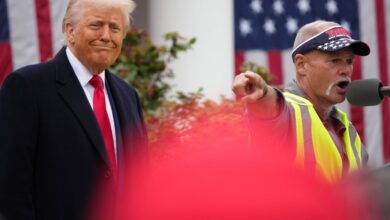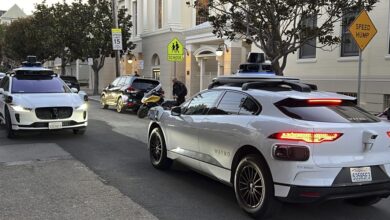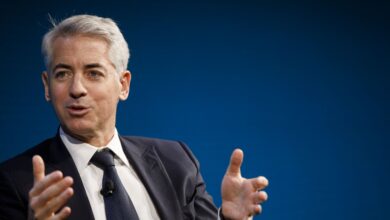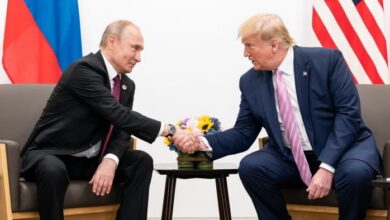Europe’s far right at odds over Trump tariffs
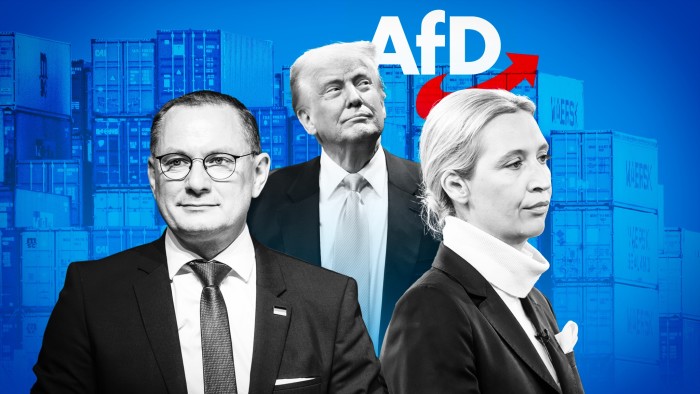
The havoc unleashed by Donald Trump’s trade war has divided Europe’s far-right parties that have courted his Maga movement.
Alice Weidel, one of the leaders of Alternative for Germany (AfD), described the US president’s moves as “far too aggressive and self-defeating”. The former Goldman Sachs analyst said that the so-called reciprocal tariffs — which Trump put on pause for 90 days after a stock market crash and fears of a global recession — were “fundamentally bad for free trade”.
But Weidel’s co-chair Tino Chrupalla, a former painter and decorator from the east German state of Saxony, described Trump’s approach as “understandable”.
“Sometimes you have to restrict free trade to protect your economy,” Chrupalla said. “President Trump wants to force other countries to negotiate. He wants to improve the US trade balance and stimulate industry.”
Analysts said that the divergence spoke to a fundamental tension at the heart of the AfD that could also be observed in Europe’s other populist movements: how to explain to their voters a protectionist US policy that would hurt their country.

Italy’s Prime Minister Giorgia Meloni — one of the few European leaders in Trump’s good books — has described his tariffs as “a mistaken choice” and expressed hope that they will be rolled back in negotiations with the EU. Visiting the White House this month, Meloni offered to host a meeting in Rome between Trump and EU officials the US president has so far shunned.
Matteo Salvini, Meloni’s coalition partner and leader of the far-right League party, last month defended Trump’s tariffs and said they could turn into an opportunity for Italian companies. He has since moderated his stance following backlash from Meloni’s Brothers of Italy party.
Hungarian Prime Minister Viktor Orbán, Trump’s longtime ally and Brussels antagonist, described the US president’s tariff war as “tactical” and a way to extract more concessions from the EU.
André Ventura, who leads Portugal’s far-right Chega party, has also sided with Trump, saying that his country should emulate the US and use tariffs to “protect itself” from cheaper textile and farming imports from China and India.
But in France, the far-right Rassemblement National has been careful not to appear aligned with the Trump administration’s trade war despite having a protectionist economic platform. Marine Le Pen said France needed to practice “intelligent protectionism” and claw back trade policy from Brussels to face Trump’s “brutal approach.”
The tension between different factions of the German far right may have been amplified by Trump, but it predates his presidency. Founded in 2013 by economists who were opposed to Eurozone bailouts, the AfD gradually expanded its ranks to include anti-globalists who also tend to embrace ethno-nationalism.
“That’s not exclusive to the AfD, but it’s very clear in the party’s platforms and positions: you have a more neoliberal wing and a more social protectionist wing,” said Thomas Greven, a political scientist at Berlin’s Freie Universität.
But all factions strongly believed in national sovereignty and embraced autocracy, he said. This meant that they would “ultimately . . . have to accept whatever a country [such as the US] is doing in pursuit of its national interests — especially since they consider Trump to be an ally in spirit”.
The party scored a record second-place finish in parliamentary elections in February, after senior figures in Trump’s circle — including Elon Musk and vice-president JD Vance — openly campaigned for it.
Peter Boehringer, an AfD vice-president and former business consultant who supports free trade, sought to play down the inner divisions over Trump’s trade war.

He pointed out that the Maga movement itself was not united on the issue: While Trump’s trade adviser Peter Navarro strongly advocates for tariffs, Musk — the world’s richest man and Trump’s government cost-cutting tsar — is in favour of free trade and has called Navarro “dumber than a sack of bricks”.
“I tend towards Elon Musk’s view,” said Boehringer. “Free trade is good for everybody”, he said. But he insisted that within the AfD the topic was “not a big deal and not a very sensitive issue”.
The success of the AfD, which has risen further in the polls since the February vote, has deeply unsettled mainstream parties, who have struggled to formulate an effective strategy for opposing it.
A prominent member of the Christian Democrats (CDU), whose leader Friedrich Merz is set to become Germany’s next chancellor next month, has said AfD lawmakers should join parliamentary committees.
CDU’s Jens Spahn argued that politicians needed to acknowledge the millions of people who had voted for the party and take them seriously. But other parties accused him of breaching the “firewall” aimed at preventing a normalisation of the AfD — a strategy that Vance had also railed against just days before the German election.
An AfD delegation travelled to Trump’s inauguration in Washington in January. It included Christina Baum, who is one of several party figures to argue that Europe only had itself to blame for the fallout from Trump’s move.
“The fact that the EU and Germany are suffering from this is a homemade problem,” Baum told the FT. Europe’s largest nation “should have long since opted for a healthy degree of self-sufficiency”, she said.
Maximilian Krah, one of the party’s most controversial MPs, was even stronger in his support for Trump’s tariffs, describing them as “the biggest changer in global trade policy since the end of the [second world] war.”
Manès Weisskircher at Dresden University of Technology, who is an expert on the far right, said that the AfD could risk voter backlash if Trump’s policies inflicted harm on Germany and they remained largely uncritical. But he cautioned that the party could also just simply shift the blame on the government.
“Far-right parties like the AfD thrive on strong dissatisfaction by parts of society,” Weisskircher said. “So if Germany’s economy struggles further, the AfD could gain support by tapping into public dismay about the government.”
Additional reporting by Amy Kazmin in Rome, Leila Abboud in Paris, Marton Dunai in Budapest and Barney Jopson in Madrid
https://www.ft.com/__origami/service/image/v2/images/raw/https%3A%2F%2Fd1e00ek4ebabms.cloudfront.net%2Fproduction%2F67acd892-6bd4-48e9-a42e-5879842347f2.jpg?source=next-article&fit=scale-down&quality=highest&width=700&dpr=1
2025-04-27 04:00:03

